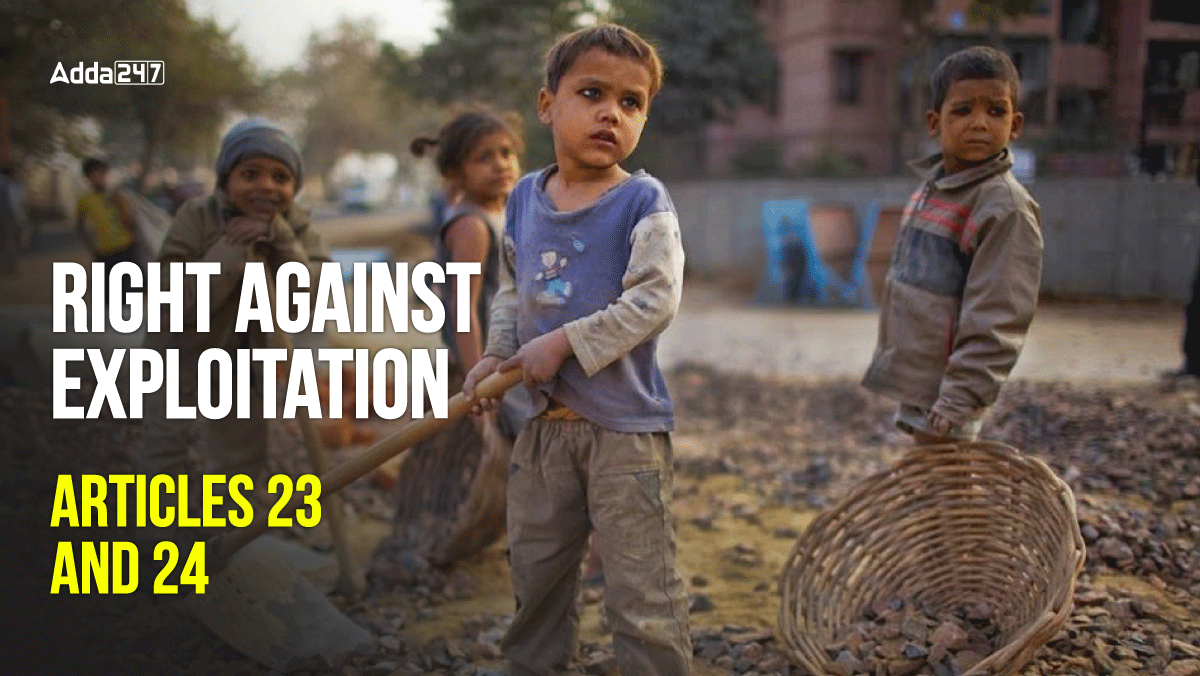Table of Contents
The Indian Constitution, a beacon of human rights, aims to ensure dignity and equality for all its citizens. A significant facet of this endeavor is the protection against exploitation, a pervasive issue that affects the most vulnerable sections of society, including children, women, and the economically disadvantaged. Exploitation, in various forms, continues to exist despite the fundamental rights guaranteed by the Constitution. Articles 23 and 24, enshrined in Part III of the Constitution, provide critical safeguards against human trafficking, forced labor, and child labor. This article explores these provisions and their importance in protecting human dignity in India.
Right Against Exploitation in India
The Right Against Exploitation, as guaranteed by Articles 23 and 24 of the Indian Constitution, forms a crucial part of the fundamental rights framework. This right ensures that no individual, regardless of their social or economic status, is subjected to inhumane treatment. It addresses serious social issues such as human trafficking, bonded labor, and child labor—practices that strip individuals of their basic human dignity and freedom. While these provisions are legally binding, their implementation remains a challenge in light of prevailing socio-economic conditions in India.
Meaning of Right Against Exploitation
Exploitation refers to the unfair or unjust treatment of individuals for personal gain. In a legal context, it covers the use of force, coercion, or deceit to derive labor or services from individuals without appropriate compensation or consent. The Indian Penal Code’s Section 370 defines exploitation as encompassing physical and sexual abuse, slavery, and bonded labor. Articles 23 and 24 of the Constitution directly address these issues by prohibiting any form of exploitation in both private and public spheres, ensuring that individuals cannot be forced into degrading situations for another’s benefit.
Types of Rights Against Exploitation
The Right Against Exploitation in India manifests in two distinct but interconnected forms:
- Prohibition of Human Trafficking and Forced Labor: Article 23 prohibits human trafficking and any form of forced labor, including bonded labor (begar), where individuals are compelled to work under threat or coercion without just compensation.
- Prohibition of Child Labor: Article 24 protects children by banning the employment of anyone under 14 in dangerous jobs, like working in factories and mines. This law is important because it helps keep children safe from physical and mental harm during their crucial growing years.
Provisions under the Indian Constitution for Right Against Exploitation
In People’s Union for Democratic Rights v. Union of India (1982), the Supreme Court extended the definition of forced labor to include situations where individuals are forced to work for wages below the statutory minimum wage, recognizing that economic exploitation also constitutes forced labor.
Article 24 prohibits the employment of children below the age of 14 in any hazardous occupation, such as factories and mines. This provision, read in conjunction with Articles 39(e) and 39(f) of the Directive Principles of State Policy, aims to safeguard children’s health and provide them with the opportunity to lead a dignified life.
Prohibition of Employment of Children in Factories
Article 24 plays a pivotal role in protecting children from being subjected to dangerous work environments. The prohibition extends to any form of employment that could endanger their health, well-being, or education. The Child Labour (Prohibition and Regulation) Act, 1986 provides a statutory framework for enforcing this right, ensuring that children are not exploited for labor in hazardous industries.
In M.C. Mehta v. State of Tamil Nadu (1996), the Supreme Court reinforced the need to protect children from hazardous occupations, particularly in the fireworks industry in Sivakasi, Tamil Nadu. The court ordered the payment of compensation to families of children engaged in such industries and mandated stricter regulations to prevent child labor.
Significance of Right Against Exploitation
The Right Against Exploitation holds immense significance in ensuring human dignity and equality. By prohibiting practices such as bonded labor and child labor, these Constitutional provisions aim to prevent the abuse of vulnerable sections of society. They promote social justice by ensuring that individuals are not forced into labor under inhumane conditions, thereby upholding their right to live with dignity.
Furthermore, the Judiciary has been instrumental in expanding the scope of these rights. In Bandhua Mukti Morcha v. Union of India (1997), the Supreme Court emphasized the socio-economic factors contributing to exploitation, urging the State to take proactive measures to rehabilitate victims of bonded labor and provide them with education and employment opportunities.
Conclusion
The Right Against Exploitation enshrined in Articles 23 and 24 of the Indian Constitution reflects India’s commitment to upholding human dignity and social justice. These provisions protect individuals from inhumane practices such as human trafficking, forced labor, and child labor. However, while the legal framework is robust, effective implementation remains a challenge due to underlying issues such as poverty and lack of awareness. Moving forward, a combined effort by the government, judiciary, and civil society is essential to ensure that these constitutional safeguards are realized in practice. Effective enforcement, coupled with initiatives for poverty alleviation and education, will be key to eradicating exploitation and ensuring the protection of every individual’s fundamental rights.
| Related Article | |
| Understanding Article 356 | |
| Sexual Harassment at Work Place | |
| What is Coalition government? | |



 TSPSC Group 1 Question Paper 2024, Downl...
TSPSC Group 1 Question Paper 2024, Downl...
 TSPSC Group 1 Answer key 2024 Out, Downl...
TSPSC Group 1 Answer key 2024 Out, Downl...
 UPSC Prelims 2024 Question Paper, Downlo...
UPSC Prelims 2024 Question Paper, Downlo...





